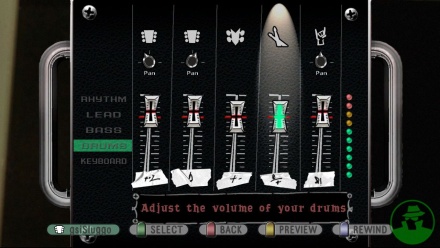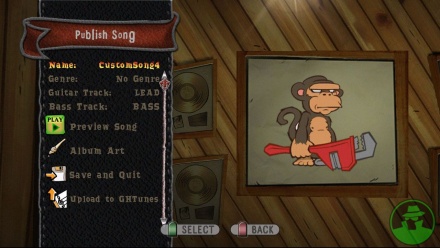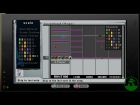The final track we added was the keyboard, which is meant to act as a substitute for vocals. (In fact, anything you record on the keyboard track will be playable as a vocal track when saved, so keep that in mind if you're planning on adding any "Jump"-like keyboard solos.) Once again, you can only record single notes here, which is disappointing if you're hoping to use some of the string, synth or organ sounds as background support.
The keyboard sounds here draw from the same bank of 80 available for the bass track, and tend to fall into the more analog old-school category, with big brassy synth sounds and lots of sound effects. One thing worth noting: there are a few "videogame" sounds, which we're betting will lead to the rapid creation of some classic videogame theme songs from decades past.

Tuning In
Once you have all the parts for your song recorded and placed where you want them, you're in the home stretch. All that's left now is make sure you're happy with the mix and then publish it to GHTunes.
The mixer is pretty straightforward: You'll see volume levels for all five tracks, and in addition to setting different volumes for each, you can also adjust panning left and right for the keyboard, lead and rhythm guitar tracks. There's a Preview option so you can hear how it sounds, and a Rewind button to jump back if you need to hear it again... and again and again.
Finally, the last step is to Publish. Quitting out of the recording studio or GH Mix takes you back to the "My Songs" screen, which is where you can pick a song to play, edit or publish. The Publish option brings up a screen with even more options, letting you name your song, pick whether the lead or rhythm track should be played in-game, attach a genre tag to your song, and even create album art before uploading it to GHTunes.
Once you've uploaded a song, it's given a unique ID, and while the author can edit and upload new versions of it, it's up to the users whether to download the new version or not.

This led to an interesting discussion on the issue of how copyright-protected material would be handled on GHTunes. Obviously, if something blatant is noticed, or if a copyright holder asks for something to be removed, it'll be taken off GHTunes. But once someone's downloaded a song to their hard drive, it's basically there for good. On the flip side, there's no option to take a song and "save as new," so once a song's been yanked, no one can re-save it under a new name and re-upload it.
And really, having gotten a feel for the studio's capabilities and limitations, it seems unlikely that the studio will be used primarily to try and recreate popular songs. With a fixed set of samples to choose from, odds are the coolest stuff will come from people taking the subset of sounds within the studio and figuring out how to shape them into something cool. We're looking forward to seeing what the community puts together after Guitar Hero World Tour is released this weekend.





